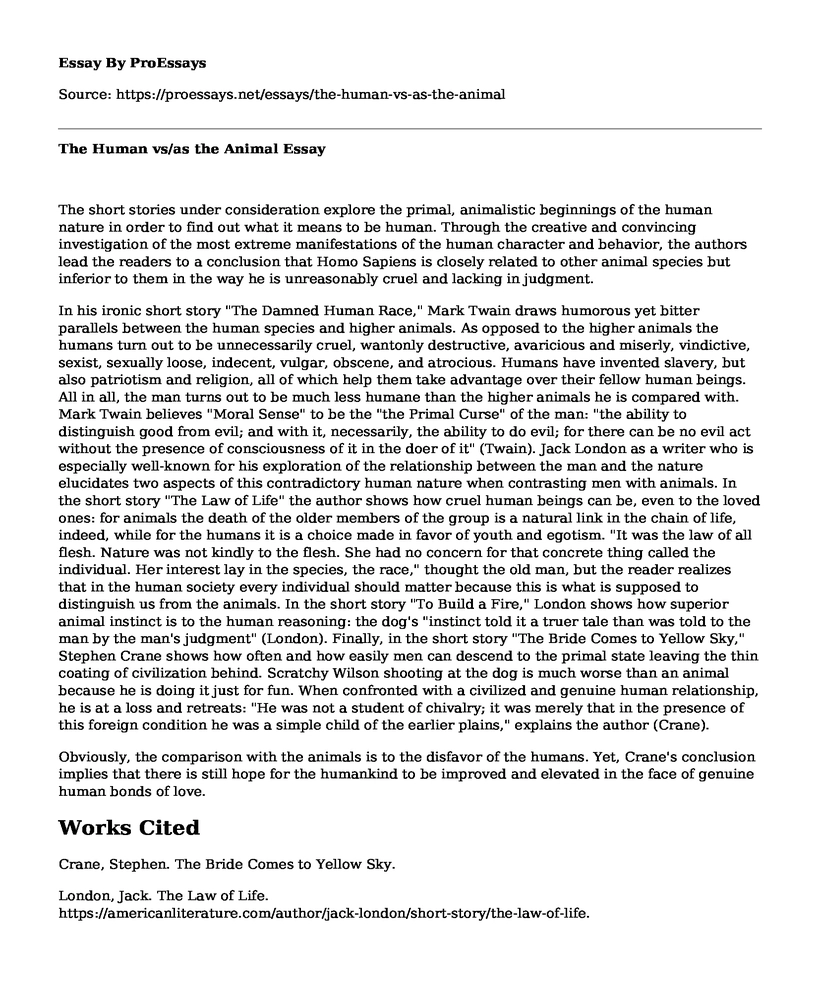The short stories under consideration explore the primal, animalistic beginnings of the human nature in order to find out what it means to be human. Through the creative and convincing investigation of the most extreme manifestations of the human character and behavior, the authors lead the readers to a conclusion that Homo Sapiens is closely related to other animal species but inferior to them in the way he is unreasonably cruel and lacking in judgment.
In his ironic short story "The Damned Human Race," Mark Twain draws humorous yet bitter parallels between the human species and higher animals. As opposed to the higher animals the humans turn out to be unnecessarily cruel, wantonly destructive, avaricious and miserly, vindictive, sexist, sexually loose, indecent, vulgar, obscene, and atrocious. Humans have invented slavery, but also patriotism and religion, all of which help them take advantage over their fellow human beings. All in all, the man turns out to be much less humane than the higher animals he is compared with. Mark Twain believes "Moral Sense" to be the "the Primal Curse" of the man: "the ability to distinguish good from evil; and with it, necessarily, the ability to do evil; for there can be no evil act without the presence of consciousness of it in the doer of it" (Twain). Jack London as a writer who is especially well-known for his exploration of the relationship between the man and the nature elucidates two aspects of this contradictory human nature when contrasting men with animals. In the short story "The Law of Life" the author shows how cruel human beings can be, even to the loved ones: for animals the death of the older members of the group is a natural link in the chain of life, indeed, while for the humans it is a choice made in favor of youth and egotism. "It was the law of all flesh. Nature was not kindly to the flesh. She had no concern for that concrete thing called the individual. Her interest lay in the species, the race," thought the old man, but the reader realizes that in the human society every individual should matter because this is what is supposed to distinguish us from the animals. In the short story "To Build a Fire," London shows how superior animal instinct is to the human reasoning: the dog's "instinct told it a truer tale than was told to the man by the man's judgment" (London). Finally, in the short story "The Bride Comes to Yellow Sky," Stephen Crane shows how often and how easily men can descend to the primal state leaving the thin coating of civilization behind. Scratchy Wilson shooting at the dog is much worse than an animal because he is doing it just for fun. When confronted with a civilized and genuine human relationship, he is at a loss and retreats: "He was not a student of chivalry; it was merely that in the presence of this foreign condition he was a simple child of the earlier plains," explains the author (Crane).
Obviously, the comparison with the animals is to the disfavor of the humans. Yet, Crane's conclusion implies that there is still hope for the humankind to be improved and elevated in the face of genuine human bonds of love.
Works Cited
Crane, Stephen. The Bride Comes to Yellow Sky.
London, Jack. The Law of Life. https://americanliterature.com/author/jack-london/short-story/the-law-of-life.
London, Jack. To Build a Fire. https://americanliterature.com/author/jack-london/short-story/to-build-a-fire.
Twain, Mark. The Damned Human Race.
Cite this page
The Human vs/as the Animal. (2022, Mar 03). Retrieved from https://proessays.net/essays/the-human-vs-as-the-animal
If you are the original author of this essay and no longer wish to have it published on the ProEssays website, please click below to request its removal:
- Article Analysis: Existentialism: Basic Reading
- Cooperate Philanthropy Essay
- The Theme of Sexual Immorality in the Old Testament
- The "Highest Good" - Essay Sample
- Animal Testing: Pros & Cons of a Controversial Practice - Essay Sample
- Essay Example: Non-Renewable Resource Depletion & Sustainable Development Models
- Paper Example on Ethical Decision-Making: Kant and Utilitarianism Perspectives







